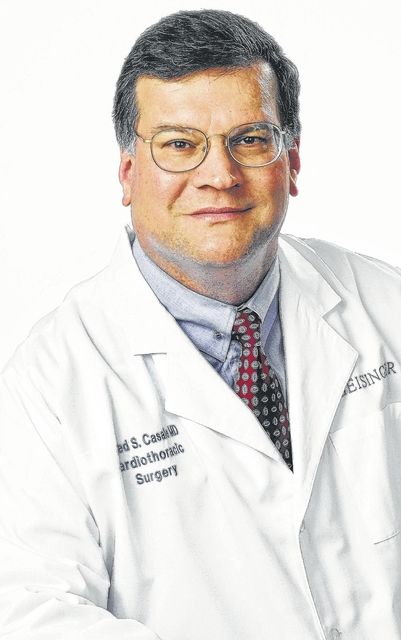Click here to subscribe today or Login.
One of the most satisfying parts of my professional life is knowing that very often the somewhat brief but incredibly intense involvement my team and I have with a patient and their families has a lasting positive effect on all. Certainly the improvement in stamina, reduction in symptoms and prolongation of life expectancy are marvelous accomplishments; however, the long term results of our operations depend mostly on how effective we teach and motivate the patient and their circle of loved ones to develop good health habits.
Most heart operations are remarkably successful in fixing the mechanical problems that hardening of the arteries or valve deterioration has led to, but we don’t cure the disease that caused the problem. Replacing a rusty pipe doesn’t cure the process of rust!
Lifestyle chances and ongoing medical care of the root causes of heart disease are key.
Walk into any gym or health club in your town during the first week in January and you’ll have to wait in line for a treadmill or elliptical trainer. Most of us make New Year’s resolutions to get fitter, healthier, lose weight and cut down on alcohol or junk food. However, by the end of January most gyms are back to normal and many people are on the couch eating chips and cookies.
The problem is that most health-related resolutions are well-intentioned but unrealistic. People get tired, injured or frustrated by the lack of immediate results. The better approach is to start making small changes that can lead to big benefits.
Sweeping changes to diet and exercise routines, especially around New Year’s, almost never work. People want to do the right thing, but typically overestimate their ability to stick with it over the long run.
Small changes that add up
Instead of going to extremes, make some of the following small changes that can add up to significant improvements over time:
* Diet: Starvation diets and the latest extreme diet fads may produce immediate results, but they don’t last. As soon as the diet is over, you’ll gain the weight back. Instead, make small dietary changes. If you regularly consume a 150-calorie, sugar-laden soda at lunch, substitute water. This small change will remove over 1,000 empty calories and nearly 65 teaspoons of added sugar from your diet every week.
* Exercise: If you are sedentary or close to it, setting the expectation of working out one hour every day may be unrealistic. The current recommendation for a healthy level of exercise is 150 minutes per week; or 30 minutes per day, five times per week. Even this may be too much if you haven’t exercised in a while. Start with a 10- or 20-minute walk before dinner to build up your endurance. If you’re already a walker and want to start running, alternate one minute of running with two minutes of walking to gain stamina.
It’s a good idea to focus on your diet and activity level at the same time if you want to make improvements to your health. As they say, you can’t out-exercise bad eating habits, so making small changes in both areas is essential.
* Stress-reduction: If you work a full-time job or manage a household, stress is probably a part of everyday life. Committing to a daily yoga routine or booking regular trips to a day spa may seem like a good solution, but may be logistically difficult and too time-consuming. Instead, schedule a few minutes every day for meditation, quiet reflection or breathing exercises. Even a short time spent on these activities has been show to help with anxiety, depression and stress.
Your health is closely tied to your ongoing habits, which means that something you do every day will impact you positively or negatively. If you make a plan to enact small but important changes over time – instead of trying to do everything at once – you’ll have much better long-term results … and avoid seeing us professionally!








